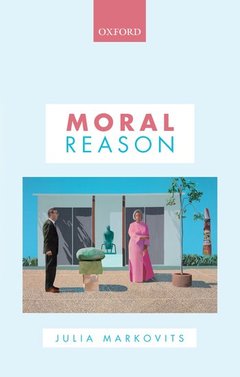Description
Moral Reason
Oxford Philosophical Monographs Series
Author: Markovits Julia
Language: English
Publication date: 02-2017
222 p. · 13.9x21.5 cm · Paperback
222 p. · 13.9x21.5 cm · Paperback
Description
/li>Biography
/li>
What is it to have a reason to do something? is one sort of question; what is it we have reason to do? is another. These questions are often explored separately. But our answers to them may not be independent: what reasons are may have implications for what reasons there are. So the door is opened to a troubling tension--the account of what reasons are that is most plausible in its own right could entail a view of what we have reason to do that is independently implausible. In fact, it looks like this is the case. In the first half of Moral Reason, Julia Markovits develops and defends a version of a desire-based, internalist, account of what normative reasons are. But does that account entail that there are no moral reasons that apply to all of us, regardless of what we happen to desire? It may look obvious that it does--that a bullet must be bitten somewhere. If what we have reason to do depends on what we antecedently desire, corrected only for misinformation and procedural irrationalities, and if desires differ from person to person, there seems to be no basis for assuming that everyone has reason to be moral. But the bullet may yet be avoided. In the second half of the book, Markovits shows how we may do so, building on Kant's argument for his formula of humanity to provide an internalist defense of universal moral reasons. In doing so, she provides a more satisfying answer to the age-old question: why be moral?
Julia Markovits is Associate Professor of Philosophy in the Department of Linguistics and Philosophy at the Massachusetts Institute of Technology, where she has taught since 2009. Before she came to MIT, she spent three years as a Junior Fellow at the Harvard Society of Fellows. She studied philosophy as an undergraduate at Yale University, and then completed a B.Phil (2003) and a D.Phil (2006) in philosophy at the University of Oxford.
© 2024 LAVOISIER S.A.S.




